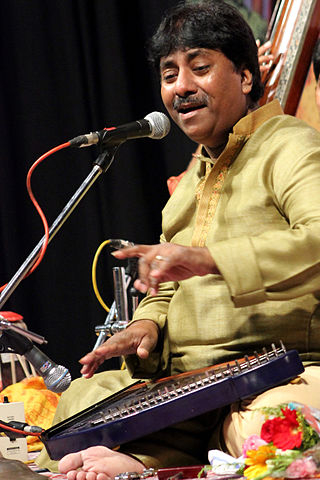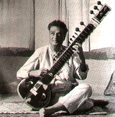Hafeez Ahmed Khan | |
|---|---|
| Born | Uttar Pradesh, India |
| Died | 2006 |
| Occupation | Classical musician |
| Known for | Rampur-Sahaswan gharana - Hindustani music |
| Awards | Padma Shri Sangeet Natak Akademi Award |
Hafeez Ahmed Khan (died 2006) was an Indian classical musician of Hindustani classical music. [1] He is known as one of the leading exponents of the Rampur-Sahaswan gharana, a musical school popular in the northern parts of the Indian state of Uttar Pradesh. [2] He learnt music in gurukul system and pursued his academic studies the conventional way, secured a master's degree in politics and taught at the University of Minnesota. [1] He was a deputy director of the All India Radio and the vice chancellor of the Indira Kala Sangeet University, the only Indian university dedicated to music. [1] [2] He mentored many disciples such as Rajendra Prasanna, Roma Rani Bhattacharya, Sakuntala Narasimhan and Subhendu Ghosh [3] and acted in a German movie on the life of Tansen, by name, The Rain Maker. [1] He was a recipient of the 1996 Sangeet Natak Akademi Award. [4] The Government of India awarded her the fourth highest civilian honour of the Padma Shri in 1991. [5] Hafeez Ahmed Khan, who was married to the daughter of renowned singer, Nissar Hussain Khan, [6] died in 2006. [2]

Rai Chand Boral was an Indian composer, considered by music connoisseurs to be the Bhishma Pitamah, the father of film music in India.
Sulochana Brahaspati is one of the noted vocalist of Hindustani classical music.
Ramanlal C. Mehta was an Indian musician and musicologist. In 2009, he was awarded the Padma Bhushan, India's third-highest civilian honour.

Rashid Khan was an Indian classical musician in the Hindustani tradition. He belonged to the Rampur-Sahaswan gharana, and was the great-grandson of gharana founder Inayat Hussain Khan. He was married to Soma Khan.

Ahmed Hussain and Mohammed Hussain are ghazal singers from Jaipur, India. They are two brothers who sing classical ghazals and devotional music.
Ustad Ahmed Jan Khan "Thirakwa" was an Indian tabla player, commonly considered the pre-eminent soloist among tabla players of the 20th century, and among the most influential percussionists in the history of Indian Classical Music.
The Gwalior Gharana is one of the oldest Khyal Gharana in Indian classical music. The rise of the Gwalior Gharana started with the reign of the Mughal emperor Akbar (1542–1605).

Hirābai Barodekar was an Indian Hindustāni classical music singer, of Kirana gharana. She was disciple of Ustād Abdul Wahid Khān.
Rampur-Sahaswan gharana is a gharana of Hindustani classical music centred in the North-Uttar Pradesh towns of Rampur and Sahaswan.

Ustad Sabri Khan was an Indian sarangi player, who was descended on both sides of his family from a line of distinguished musicians.
Ustad Nissar Hussain Khan was an Indian classical vocalist from the Rampur-Sahaswan gharana. He was a disciple and son of Fida Hussain Khan and after a long and illustrious career was awarded the Padma Bhushan in 1971.
Sumati Mutatkar was an Indian classical music vocalist and musicologist from the Agra gharana of Hindustani classical music, and a Professor of Department of Music in University of Delhi.

Abdul Halim Jaffer Khan was an Indian sitar player. Khan received the national awards Padma Shri (1970) and Padma Bhushan (2006) and was awarded the Sangeet Natak Akademi Award for 1987.

Ustad Ghulam Mustafa Khan was an Indian classical musician in the Hindustani classical music tradition, belonging to the Rampur-Sahaswan Gharana.

Rajendra Prasanna is an Indian classical flautist and shehnai player from Benares Gharana.

Shanno Khurana is a noted Indian classical vocalist and composer, from the Rampur-Sahaswan gharana of Hindustani classical music. A disciple of the doyen of the gharana, Ustad Mushtaq Hussain Khan, she is known for performing rare bandish and raag, though her singing style includes genres like khayal, tarana, thumri, dadra, tappa, to chaiti and bhajan. Born and brought up in Jodhpur, she started singing on All India Radio in 1945 in Lahore, later shifted to Delhi, where she continued her singing on All India Radio, Delhi and in concerts and music festivals. She also pursued music education, finally earning her M.Phil. and PhD in music from the Kairagarh University, and has undertakes extensive research on folk music of Rajasthan.
Naina Devi also known as Naina Ripjit Singh, was Indian vocalist of Hindustani classical music, most known for her thumri renditions, though she also sang dadra and ghazals. She was a music producer at All India Radio and later with Doordarshan. She started her musical training under Girja Shankar Chakravarty in her teens, later restarted it with Ustad Mushtaq Hussain Khan of Rampur-Sahaswan gharana and Rasoolan Bai of Benaras gharana, in the 1950s. Born in an aristocratic family in Kolkata, she was married into the royal family of Kapurthala State at age 16, and was started singing in concerts only after her husband died in 1949, and she moved to Delhi.
Ustad Mashkoor Ali Khan is an Indian classical singer and teacher from the Kirana musical style. As the grandson of Abdul Karim Khan, a founder of the Kirana style, he is a descendant of the gharana's family lineage. He was educated by his father, sarangi player Shakoor Khan.
Gaan Maharishi Pt. Krishnarao Shankar Pandit (1893–1989) was an Indian musician, considered by many as one of the leading vocalists of the Gwalior gharana. He authored several articles and 8 books on music and was the founder of Shankar Gandharva Mahavidyalaya, a music college based in Gwalior. The Government of India awarded him the third highest civilian honour of the Padma Bhushan, in 1973, for his contributions to music. He was also a recipient of several other honors, including the 1959 Sangeet Natak Akademi Award and the 1980 Tansen Award of the Government of Madhya Pradesh.

Ustad Mushtaq Hussain Khan (1878–1964) was an Indian classical vocalist. He belonged to the Rampur-Sahaswan gharana.